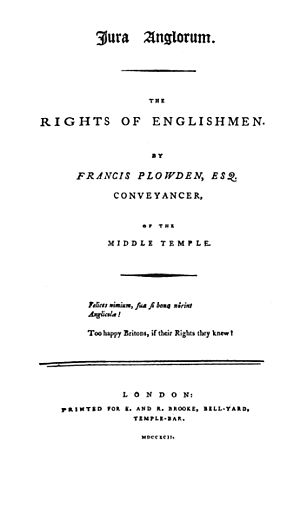Francis Plowden (barrister) facts for kids
Francis Peter Plowden (born June 8, 1749 – died January 4, 1829) was an English Jesuit (a member of a Catholic religious order), a barrister (a type of lawyer), and a writer. He is known for his writings on law and history, especially about Ireland.
Contents
Francis Plowden's Early Life and Education
Francis Plowden was born in Shropshire, England, on June 8, 1749. He was one of many sons in his family. He went to school at St. Omer's College. In 1766, he joined the Jesuit order as a novice in Watten. This meant he was training to become a Jesuit priest.
Life After the Jesuits
When the Jesuit order was closed down by the Pope, Francis was teaching at a college in Bruges. Since he was not yet a priest, he was no longer bound by his first promises to the order. Soon after, he married Dorothea, whose father was George J. Griffith Phillips. Dorothea's family lived in Carmarthenshire, Wales.
Becoming a Lawyer and Writer
Francis Plowden began studying law at the Middle Temple in London. At that time, Catholics faced strict laws in Britain. They could only work in certain legal jobs. Francis became a conveyancer, a lawyer who deals with property transfers.
After the Relief Act of 1791 was passed, Catholics gained more rights. Francis was then able to become a full barrister. His first important book, Jura Anglorum, came out in 1792. It talked about natural rights and agreements. The University of Oxford was very impressed with his book. They gave him an honorary degree, which was very rare for a Catholic back then.
Challenges and Later Life
Francis Plowden had strong opinions and sometimes disagreed with important people. He stopped working as a barrister after a disagreement with the Lord Chancellor (a senior government official). He then focused on writing.
In 1811, while in Dublin, he published a book called "Ireland since the Union." The government was unhappy with some things he wrote. They sued him for writing something that criticized them. A court ordered him to pay a large sum of money. Francis believed the jury was unfair. He decided not to pay and moved to Paris. He spent his last years there, teaching at the Scots College. He passed away on January 4, 1829, at the age of 79.
Francis Plowden's Family Life
Francis Plowden's wife, Dorothea, was also a writer. She wrote a play called Virginia. However, the play was not well-received when it first opened.
Their oldest daughter, Anna Maria, married Archibald, the ninth Earl of Dundonald.
Francis Plowden's Major Works
Francis Plowden wrote many books, mostly about history and law.
Historical Writings
One of his important works was Historical Review of the State of Ireland (1803). The government had asked him to write it. However, his book was very critical of the government's actions. Others, like Richard Musgrave, criticized Plowden's book. Plowden wrote more pieces to explain his views.
He also wrote Historical Letters to Sir John Coxe Hippisley (1815). These letters discussed the issue of Catholic emancipation, which was about giving more rights to Catholics.
Other Publications
Some of his other notable books include:
- The Case Stated (1791) – about the Catholic Relief Act.
- Church and State (1794) – about the relationship between religion and government.
- Treatise on the Law of Usury (1796) – about laws related to lending money at interest.
- The Constitution of the United Kingdom (1802) – about the British government system.
- Human Subordination (1824) – published in Paris.
 | Dorothy Vaughan |
 | Charles Henry Turner |
 | Hildrus Poindexter |
 | Henry Cecil McBay |


